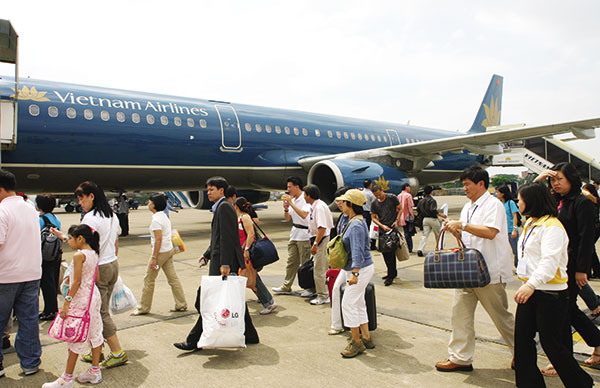Vietnam Airlines to divest state shares
 |
| Vietnam Airlines has a solid plan in place for divestment of state holdings_Photo: Le Toan |
A two-phase plan
Although Vietnam Airlines is waiting to receive the green light from the regulatory authorities, its plan to divest state shares down to 51 per cent within the next three years has begun to take shape.
The airline has recently submitted a report focusing on its restructuring from 2013 to 2015, and a plan for 2017 to 2020. Under this plan, the airline will divest state holdings in two phases.
In the period of 2017-2018, Vietnam Airlines will issue more than 191 million shares to current shareholders so as to increase its charter capital. It will also transfer the right to buy the 57.9 million state shareholders’ shares, according to the plan approved by the government in May 2017.
The sale is expected to be completed by the first quarter of 2018. If Vietnam Airlines achieves a complete take-up, it will kill two birds with one stone by raising its charter capital to VND14 trillion ($616 million) and equity capital to VND16 trillion ($704 million), while reducing state ownership by 4.1 per cent to 82.1 per cent.
In the period of 2018-2019, Vietnam Airlines will continue the sale to raise its charter capital. With the issue of 10 to 20 per cent new stake to the market, the airline will lower state ownership to 60-65 per cent. At the same time, state shareholders will continue to divest down another 10 to 15 per cent of state holdings.
If everything goes as planned, the government will reduce its holdings in Vietnam Airlines to 51 per cent. The plan follows Decision No. 1232/QD-TTg on August 17, approving the state stake divestment for state-owned enterprises (SOEs) and corporations for the period of 2017-2020.
Duong Tri Thanh, general director of Vietnam Airlines, said that, following the capital increase in the first phase, Vietnam Airlines will move its listed shares under the stock code HVN to Ho Chi Minh City Stock Exchange (HoSE) in the second quarter of 2018.
The move aims to improve liquidity in HVN shares of Vietnam Airlines, thereby promoting the national carrier’s image, as well as facilitating upcoming capital injection and divestment plans.
The concerns of market absorption
Vietnam Airlines’ current chartered capital is VND12.27 trillion ($539.88 million), of which the state owns 1,057 million shares (or an 86 per cent stake). 107 million shares (or an 8.7 per cent stake) are owned by Japan’s largest airline, ANA Holdings.
To reduce state ownership of the airline, state shareholders need to sell over 430 million shares for the par value of VND4.34 trillion ($190.96 million). Regarding the market value, state shareholders are expected to earn roughly VND17 trillion ($748 million) as HVN shares currently stand at VND40,000 ($1.76) apiece.
Vietnam Airlines has achieved better performance after becoming a joint-stock company in April 2015. However, the airline should gauge the market absorption within the next three years, especially when Vietnam accelerates its state divestment from high-profile businesses with large charter capital.
Elsewhere in the aviation industry, Airports Corporation of Vietnam (ACV) will divest a 28 per cent state stake or 435.5 million in shares with a price of VND10,000 apiece ($0.44) in 2018. With an average transaction price of VND90,000 ($3.96), market capitalisation for state shares at ACV is likely to reach VND39 trillion ($1.71 billion).
The representatives of state shareholders at Vietnam Airlines are taking into consideration the capital injection plan to lower state holdings. Specifically, Vietnam Airlines may choose to sell shares to new investors via private placement, issue shares to current shareholders, or take other measures according to regulations and market trends.
“Besides reducing state ownership to make room for new investments, Vietnam Airlines will make the most of the sale to strengthen financial capability and autonomy, as well as reduce the debt equity ratio,” said Vietnam Airlines’ leader.
What the stars mean:
★ Poor ★ ★ Promising ★★★ Good ★★★★ Very good ★★★★★ Exceptional
Latest News
More News
- GEVA a launchpad for Vietnam’s agricultural exports (January 26, 2026 | 12:03)
- Data-driven risk management signals major shift in customs administration (January 24, 2026 | 11:22)
- Cosmetics rules set for overhaul under draft decree (January 24, 2026 | 11:21)
- Vietnam Airlines seeks aircraft through dry lease (January 22, 2026 | 20:43)
- Policy obstacles being addressed in drug licensing and renewal (January 22, 2026 | 20:17)
- Vietnam’s wood exports surpass $17 billion (January 22, 2026 | 20:15)
- WinMart+ chain accelerates expansion into rural areas (January 22, 2026 | 11:15)
- 14th Party Congress empowers CPV on socialist path: Portuguese newspaper chief (January 22, 2026 | 09:42)
- Health minister highlights comprehensive, people-centred healthcare orientation (January 22, 2026 | 09:39)
- Industry-trade sector aims to turn challenges into opportunities in new era (January 22, 2026 | 09:23)















 Mobile Version
Mobile Version